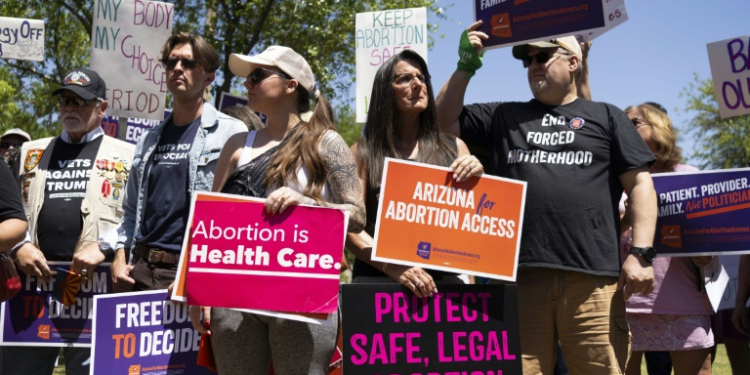Los Angeles (AFP) – Legislators in Arizona’s upper house voted Wednesday to repeal an 1864 law banning abortion, a month after the state’s supreme court said the Civil War-era rule was valid.
The turnaround was the latest development in the fraught US abortion debate, which is expected to play a huge role in this year’s presidential election, a likely rematch between President Joe Biden and Donald Trump.
“I’m glad to see the Senate answered my call and voted to repeal the 1864 total abortion ban,” the state’s Democratic Governor Katie Hobbs wrote on social media.
“While this is essential to protecting women’s health, it is just the beginning. I will never stop fighting for women’s reproductive freedoms.”
The western state jumped headlong into the divisive abortion rights debate last month when its supreme court ruled a hitherto obscure 160-year-old law was enforceable.
That law, which was drafted long before Arizona became a state and before women had the right to vote, made it a criminal offense for anyone to carry out an abortion, and allowed for prison sentences of up to five years for anyone convicted. It made no exceptions for rape or incest.
The court ruled that because the state had never legislated for the right to abortion, its practice of allowing terminations up to the 15-week mark had been underpinned only by the landmark Roe vs. Wade ruling by the US Supreme Court that had guaranteed reproductive freedoms across the country.
When the conservative-dominated court overturned that half-century-old ruling in 2022, Arizona had to revert to its original statutes, the state’s court ruled.
Republican Party leaders nationally had called on the state to moderate the ban, with Trump insisting it had gone “too far.” But local Republicans were unmoved, and the majority of the local party staunchly opposed any change.
After several attempts by Democrats, the state’s House of Representatives succeeded last week when three moderate Republicans crossed the aisle. That was repeated in the senate on Wednesday when two of them abandoned their conservative colleagues to give the motion a 16-14 majority.
In a lengthy speech on the floor of the senate, one of them, Shawnna Bolick, described her own need for an abortion, which she had been able to access well before the local supreme court ruling.
“Would Arizona’s pre-Roe law have allowed me this medical procedure even though at the time my life was not in danger?” she asked fellow senators.
Fellow Republican Anthony Kern lamented that his party could not unite around “the best abortion ban in the nation,” which he said he thought was an election winner.
While rural Arizona remains deeply conservative, the state’s fast-growing cities increasingly return Democratic Party candidates to office.
The state hangs in the balance in presidential politics, with Biden having carried it in 2020 by just 10,000 votes.
Winner –
Since the overturning of Roe vs Wade, a number of Republican-dominated states have moved to make access to abortion more difficult. Democrats have pounced every time, aware that polls show a majority of Americans support a woman’s right to choose.
Biden’s party is convinced that the issue is a winner with voters and will drive turnout at the ballot box.
They have tried to turn the spotlight on Trump, who appears stuck between boasting of his success in overturning Roe vs Wade, and worrying over the logical consequences of states restricting rights, which proves unpopular every time it is put to the electoral test.
Democrats have been collecting signatures to get an initiative on the November ballot that would see a right to abortion enshrined in state law. They hope that if people feel motivated to turn out for that initiative, they will vote in greater numbers for Biden.
© 2024 AFP





